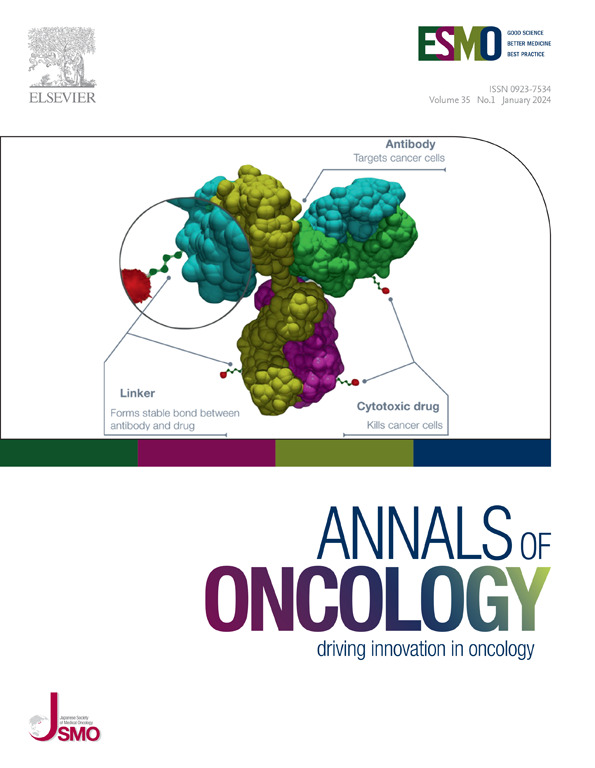European cancer mortality predictions for the year 2025 with focus on breast cancer
IF 56.7
1区 医学
Q1 ONCOLOGY
引用次数: 0
Abstract
Background
We predicted the number of cancer deaths and rates for 2025 in the European Union (EU), its five most populous countries, and the UK, focusing on breast cancer.
Materials and methods
We derived population data and death certificates for all cancers and major sites for the EU, France, Germany, Italy, Poland, Spain, and the UK since 1970, from the World Health Organization and United Nations databases. Estimates for 2025 were computed by linear regression on recent trends identified through Poisson joinpoint regression, considering the slope of the most recent trend segment. Deaths averted from 1989 to 2025 were calculated by applying the 1988 peak rate to subsequent population data.
Results
We estimated 1 280 000 cancer deaths in the EU in 2025, corresponding to age-standardised rates (ASRs) of 120.9/100 000 males (−3.5% versus 2020) and 79.1/100 000 females (−1.2%). In the UK, we predicted 173 000 cancer deaths and ASRs of 101.2/100 000 males (−10.1%) and 82.1/100 000 females (−6.3%). In the EU, favourable trends are predicted for major neoplasms, except pancreatic cancer, in males (+2.0%) and females (+3.0%), and lung (+3.8%) and bladder (+1.9%) cancers among females. Breast cancer mortality showed favourable trends in all countries. Substantial decreases were predicted for EU females aged 50-69 years (−9.8%) and 70-79 years (−12.4%). Between 1989 and 2025, we estimated about 6.8 million averted cancer deaths in the EU, including over 373 000 breast cancer deaths. Corresponding numbers for the UK were 1 500 000 and 197 000.
Conclusion
EU breast cancer rates have fallen by 30% since 1990, due to advances in prevention, treatment, and early detection. Contrasting trends in lung cancer among males and females reflect differing tobacco smoking patterns. Female lung cancer mortality is still increasing in the EU, though less than in the previous decade. Persistent unfavourable pancreatic cancer trends can be related to the increasing prevalence of obesity and limited therapeutic advances, requiring continued attention.
2025年欧洲癌症死亡率预测,重点是乳腺癌。
背景:我们预测了2025年欧盟(EU)及其五个人口最多的国家和英国的癌症死亡人数和发病率,重点关注乳腺癌。材料和方法:我们从世界卫生组织和联合国数据库中获取1970年以来欧盟、法国、德国、意大利、波兰、西班牙和英国所有癌症和主要地点的人口数据和死亡证明。考虑到最近趋势段的斜率,对泊松连接点回归确定的近期趋势进行线性回归计算2025年的估计值。1989年至2025年避免的死亡人数是通过将1988年的峰值率应用于随后的人口数据来计算的。结果:我们估计2025年欧盟有1280,000例癌症死亡,对应于年龄标准化率(ASRs)为120.9/10万男性(与2020年相比下降3.5%)和79.1/10万女性(下降1.2%)。在英国,我们预测了17.3万例癌症死亡和asr,男性为101.2/10万(-10.1%),女性为82.1/10万(-6.3%)。在欧盟,除胰腺癌外,男性(+2.0%)和女性(+3.0%)的主要肿瘤以及女性肺癌(+3.8%)和膀胱癌(+1.9%)的趋势都是有利的。乳腺癌死亡率在所有国家都显示出有利的趋势。预计50-69岁和70-79岁的欧盟女性发病率将大幅下降(-9.8%)。1989年至2025年期间,我们估计欧盟约有680万人避免了癌症死亡,其中包括超过37.3万例乳腺癌死亡。英国的相应数字分别为150万和197 000。结论:自1990年以来,由于预防、治疗和早期发现方面的进步,欧盟乳腺癌发病率下降了30%。男性和女性肺癌的不同趋势反映了不同的吸烟模式。在欧盟,女性肺癌死亡率仍在上升,尽管低于前十年。持续的胰腺癌不利趋势可能与肥胖患病率的增加和治疗进展有限有关,需要继续关注。
本文章由计算机程序翻译,如有差异,请以英文原文为准。
求助全文
约1分钟内获得全文
求助全文
来源期刊

Annals of Oncology
医学-肿瘤学
CiteScore
63.90
自引率
1.00%
发文量
3712
审稿时长
2-3 weeks
期刊介绍:
Annals of Oncology, the official journal of the European Society for Medical Oncology and the Japanese Society of Medical Oncology, offers rapid and efficient peer-reviewed publications on innovative cancer treatments and translational research in oncology and precision medicine.
The journal primarily focuses on areas such as systemic anticancer therapy, with a specific emphasis on molecular targeted agents and new immune therapies. We also welcome randomized trials, including negative results, as well as top-level guidelines. Additionally, we encourage submissions in emerging fields that are crucial to personalized medicine, such as molecular pathology, bioinformatics, modern statistics, and biotechnologies. Manuscripts related to radiotherapy, surgery, and pediatrics will be considered if they demonstrate a clear interaction with any of the aforementioned fields or if they present groundbreaking findings.
Our international editorial board comprises renowned experts who are leaders in their respective fields. Through Annals of Oncology, we strive to provide the most effective communication on the dynamic and ever-evolving global oncology landscape.
 求助内容:
求助内容: 应助结果提醒方式:
应助结果提醒方式:


